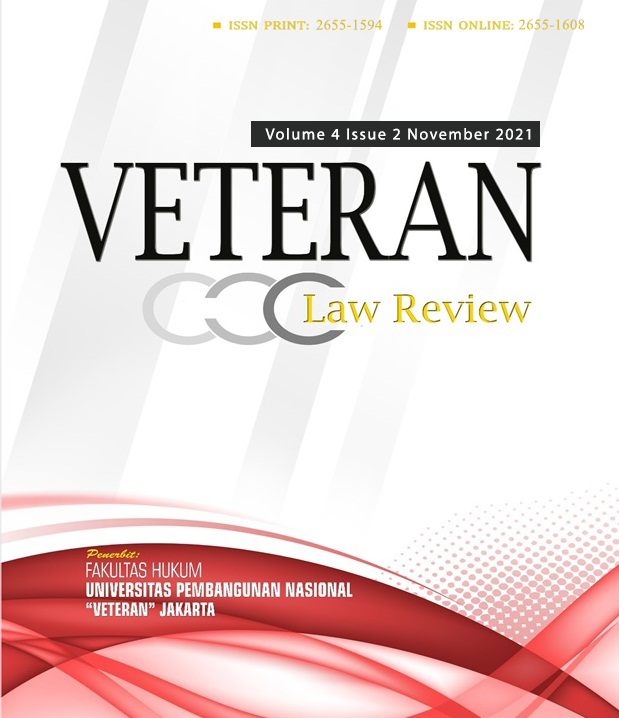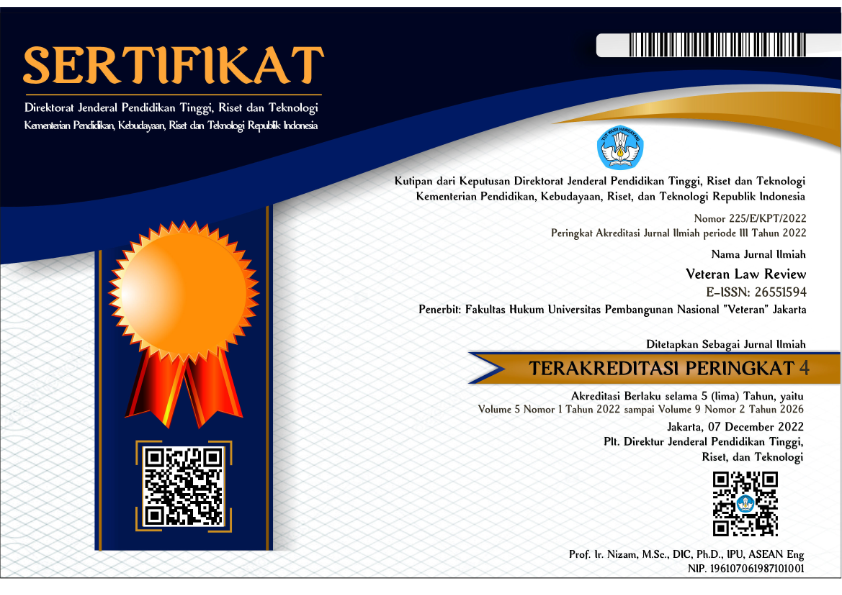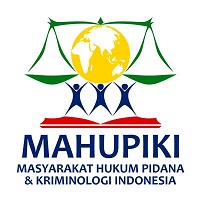Juridical Study of The Implementation of The Principles of Equality of The Parents Parties In Contruction Action Contract Which Is Made In A Notary Face
DOI:
https://doi.org/10.35586/velrev.v4i2.2736Abstract
The principle of equality, contact, notar The juridical concept of the principle of equality in the perspective of contract law is based on a civil law system that conforms to the values of justice. Contracts based on a civil law system that are in accordance with the values of justice, actually in Indonesia the application of the principle of freedom of contract is not absolute, there are certain limitations regulated in the Civil Code and other laws and regulations. The restrictions on freedom of contract that are regulated in the Civil Code include that there are no defects in the agreement, namely coercion, error, and fraud. The form of the principle of equality of the parties in the construction work contract deed made before a Notary, regarding the authority of the notary in making contracts, in Article 15 of Law Number 2 of 2014 concerning amendments to Law Number 30 of 2004 concerning the Position of a Notary, is a public official those who are authorized to make both authentic deeds and under-hand deeds as long as they are not specific to other public officials in accordance with statutory regulations or the wishes of the parties concerned to ensure that the rights and obligations of the parties are guaranteed and have legal certaintyDownloads
References
Abdulkadir Muhammad. (2011). Hukum Perdata Indonesia. Bandung: Citra Aditya Bakti.
Agus Yudhha Hernoko. (2011). Hukum Perjanjian Asas Proporsionalitas dalam Kontrak Komersial. Jakarta: Prenada Media Group.
Agus Yudha Hernoko. (2010). Hukum Perjanjian Asas proporsionalitas dalam Kontrak komersial. Jakarta: Kencana Prenada Media Group.
Ahmad Ali. (2012). Menguak Teori Hukum (Legal Theory) dan Teori Peradilan (Justiceal Prudence). Jakarta: Kencana Pranada Media Group.
Carl Joachim Friedrich. (2004). Filsafat Hukum Perspektif Historis. Bandung: Nuansa dan Nusamedia.
Choky R. Ramadhan. (2018). Konvergensi Civil Law dan Common Law di Indonesia dalam Penemuan dan Pembentukan Hukum. Jurnal Mimbar Hukum. 30 (2).
FX Djumadi. (2010). Perjanjian Pemborongan, cet 3. Jakarta: Rineka Cipta.
Habib Adjie. (2002). Penegakan Etika Profesi Notaris dari Perspektif Pendekatan Sistem. Jakarta: Media Notariat.
Hendy Sarmyendra, (et.al.). (2015). Kekuatan Berlakunya Penggunaan Blanko Akta Tanah oleh Notaris/Pejabat Pembuat Akta Tanah dalam Pengalihan Hak atas Tanah di Kabupaten Malinau Kalimantan Utara. Jurnal Beraja Niti. 4 (3).
Leny Agustan dan Khairulnas. (2013). Tata Kelola Kantor Notaris/PPAT. Jakarta: UII Press.
Made Rawa Aryawan. (2003). Asas Kebebasan Berkontrak dalam Kaitannya dengan Kewenangan Hakim untuk Menilai Eksistensi Kontrak. Jurnal Ilmu Hukum. 1 (1).
Riduan Syaharani. (2015). Masalah Bunga dan Perubahan Nilai Mata Uang. Jurnal Hukum dan Pembangunan. 11 ( 4).
Rudtanti Dorotea Tobing. (2014). Hukum Perjanjian Kredit (Konsep Perjanjian Kredit Sindikasi yang berdasarkan Demokrasi Ekonomi. Yogyakarta: Laksbang Grafika.
Stahl, F. J. dalam Yoyon Mulyana Darusman. (2016). Kedudukan Notaris Sebagai Pejabat Pembuat Akta Otentik dan Sebagai Pejabat Pembuat Akta Tanah. Adil: Jurnal Hukum. 7 (1).
Soerjono Soekanto dan Sri Mamudji. (2003). Penelitian Hukum Normatif, Suatu Tinjauan Singkat. Cetakan Keenam. Jakarta: RadaGrafindo Persada.
Sutarno. (2003). Aspek-aspek Hukum Perkreditan Pada Bank. Bandung: Alfabeta.
Tami Rusli. (2015). Asas Kebebasan Berkontrak Sebagai Dasar Perkembangan Perjanjian di Indonesia’. Pranata Hukum Jurnal Ilmu Hukum.
Tami Rusli. (2015). Asas Kebebasan Berkontrak Sebagai Dasar Perkembangan Perjanjian di Indonesia. Pranata Hukum Jurnal Ilmu Hukum. 10 (1).
Downloads
Published
How to Cite
Issue
Section
License
Copyright (c) 2022 Veteran Law Review Journal
Veteran Law Review © 2022 by Faculty of Law Universitas Pembangunan Nasional "Veteran" Jakarta is licensed under Creative Commons Attribution 4.0 International

1. License
The non-commercial use of the article will be governed by the Creative Commons Attribution license as currently displayed on Creative Commons Attribution 4.0 International.
2. Author(s)' Warranties
The author warrants that the article is original, written by the stated author(s), has not been published before, contains no unlawful statements, does not infringe the rights of others, is subject to copyright that is vested exclusively in the author, and free of any third party rights, and that any necessary written permissions to quote from other sources have been obtained by the author(s).
3. User/Public Rights
VELREV's spirit is to disseminate articles published are as free as possible. Under the Creative Commons Attribution-ShareAlike 4.0 International License. VELREV permits users to copy, distribute, display, and perform the work for non-commercial purposes only. Users will also need to attribute authors and VELREV to distributing works in the journal and other media of publications.
4. Rights of Authors
Authors retain all their rights to the published works, such as (but not limited to) the following rights;
- Reproduce the work
- Prepare derivative works based upon the work
- Distribute copies of the work
- Perform the work publicly
- Display the work publicly
- Copyright and other proprietary rights relating to the article, such as patent rights,
- The right to self-archive the article,
- The right to enter into separate, additional contractual arrangements for the non-exclusive distribution of the article's published version (e.g., post it to an institutional repository or publish it in a book), with an acknowledgement of its initial publication in this journal (Veteran Law Review).
5. Co-Authorship
If the article was jointly prepared by more than one author, any author submitting the manuscript warrants that he/she has been authorized by all co-authors to be agreed on this copyright and license notice (agreement) on their behalf, and agrees to inform his/her co-authors of the terms of this policy. VELREV will not be held liable for anything that may arise due to the author's internal dispute. VELREV will only communicate with the corresponding author.
6. Royalties
Being an open accessed journal and disseminating articles for free under the Creative Commons license term mentioned, author(s) are aware that VELREV entitles the author(s) to no royalties or other fees.
7. Miscellaneous
VELREV will publish the article (or have it published) in the journal if the article’s editorial process is successfully completed. JOSI's editors may modify the article to a style of punctuation, spelling, capitalization, referencing, and usage that deems appropriate. The author acknowledges that the article may be published so that it will be publicly accessible and such access will be free of charge for the readers as mentioned in point 3.


















